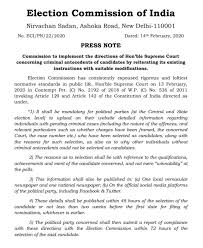Understanding the Role of the Election Commission of India

Introduction
The Election Commission of India (ECI) is a crucial body that ensures the conduct of free, fair, and impartial elections in the country. Established under Article 324 of the Constitution of India, the ECI plays a pivotal role in maintaining the democratic process by overseeing elections at both the national and state levels. Understanding its functions and recent developments is vital for citizens who wish to engage in the democratic process.
Functions of the Election Commission
The Election Commission is responsible for several key functions, which include:
- Conducting Elections: The primary role of the ECI is to conduct elections for the Lok Sabha, Rajya Sabha, and State Legislative Assemblies, and also for the offices of the President and Vice-President of India.
- Preparation of Electoral Rolls: The ECI prepares and maintains updated electoral rolls to ensure that every eligible citizen can participate in the electoral process.
- Monitoring Political Parties: The commission regulates the registration of political parties and ensures compliance with the electoral laws.
- Implementing Model Code of Conduct: The ECI enforces the Model Code of Conduct, which governs the behavior of political parties and candidates during elections.
Recent Developments
In the lead-up to the upcoming state assembly elections, the Election Commission has been focusing on increasing voter turnout and ensuring transparency in the electoral process. Recent initiatives include:
- Voter Awareness Campaigns: The ECI has launched various campaigns aimed at educating voters about the election process and encouraging them to participate.
- Use of Technology: The commission has embraced technology to enhance the voting experience, including the use of Electronic Voting Machines (EVMs) and Voter Verified Paper Audit Trails (VVPAT) to ensure transparency.
- Strengthening Security Arrangements: The Election Commission has collaborated with local law enforcement agencies to ensure the safety and security of voters during elections.
Conclusion
The Election Commission of India remains a cornerstone of democracy in the country, tasked with the monumental responsibility of ensuring that elections are conducted in a free and fair manner. As India prepares for a series of elections in the coming months, the role of the ECI will be more crucial than ever. It is imperative for citizens to engage with the electoral process actively, understand their rights, and participate in shaping the country’s future through voting. The significance of the Election Commission cannot be understated, as it upholds the democratic values upon which the nation stands.









